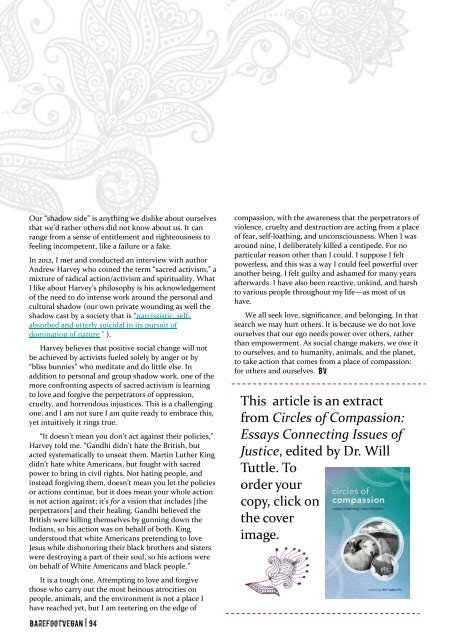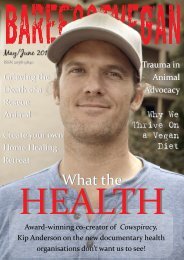Barefoot Vegan Mag Jan_Feb 2017
Create successful ePaper yourself
Turn your PDF publications into a flip-book with our unique Google optimized e-Paper software.
Our “shadow side” is anything we dislike about ourselves<br />
that we’d rather others did not know about us. It can<br />
range from a sense of entitlement and righteousness to<br />
feeling incompetent, like a failure or a fake.<br />
In 2012, I met and conducted an interview with author<br />
Andrew Harvey who coined the term “sacred activism,” a<br />
mixture of radical action/activism and spirituality. What<br />
I like about Harvey’s philosophy is his acknowledgement<br />
of the need to do intense work around the personal and<br />
cultural shadow (our own private wounding as well the<br />
shadow cast by a society that is “narcissistic, selfabsorbed<br />
and utterly suicidal in its pursuit of<br />
domination of nature ” ).<br />
Harvey believes that positive social change will not<br />
be achieved by activists fueled solely by anger or by<br />
“bliss bunnies” who meditate and do little else. In<br />
addition to personal and group shadow work, one of the<br />
more confronting aspects of sacred activism is learning<br />
to love and forgive the perpetrators of oppression,<br />
cruelty, and horrendous injustices. This is a challenging<br />
one, and I am not sure I am quite ready to embrace this,<br />
yet intuitively it rings true.<br />
“It doesn’t mean you don’t act against their policies,”<br />
Harvey told me. “Gandhi didn’t hate the British, but<br />
acted systematically to unseat them. Martin Luther King<br />
didn’t hate white Americans, but fought with sacred<br />
power to bring in civil rights. Not hating people, and<br />
instead forgiving them, doesn’t mean you let the policies<br />
or actions continue, but it does mean your whole action<br />
is not action against; it’s for a vision that includes [the<br />
perpetrators] and their healing. Gandhi believed the<br />
British were killing themselves by gunning down the<br />
Indians, so his action was on behalf of both. King<br />
understood that white Americans pretending to love<br />
Jesus while dishonoring their black brothers and sisters<br />
were destroying a part of their soul, so his actions were<br />
on behalf of White Americans and black people.”<br />
It is a tough one. Attempting to love and forgive<br />
those who carry out the most heinous atrocities on<br />
people, animals, and the environment is not a place I<br />
have reached yet, but I am teetering on the edge of<br />
compassion, with the awareness that the perpetrators of<br />
violence, cruelty and destruction are acting from a place<br />
of fear, self-loathing, and unconsciousness. When I was<br />
around nine, I deliberately killed a centipede. For no<br />
particular reason other than I could. I suppose I felt<br />
powerless, and this was a way I could feel powerful over<br />
another being. I felt guilty and ashamed for many years<br />
afterwards. I have also been reactive, unkind, and harsh<br />
to various people throughout my life—as most of us<br />
have.<br />
We all seek love, significance, and belonging. In that<br />
search we may hurt others. It is because we do not love<br />
ourselves that our ego needs power over others, rather<br />
than empowerment. As social change makers, we owe it<br />
to ourselves, and to humanity, animals, and the planet,<br />
to take action that comes from a place of compassion:<br />
for others and ourselves. BV<br />
This article is an extract<br />
from Circles of Compassion:<br />
Essays Connecting Issues of<br />
Justice, edited by Dr. Will<br />
Tuttle. To<br />
order your<br />
copy, click on<br />
the cover<br />
image.<br />
BAREFOOT<strong>Vegan</strong> | 94





